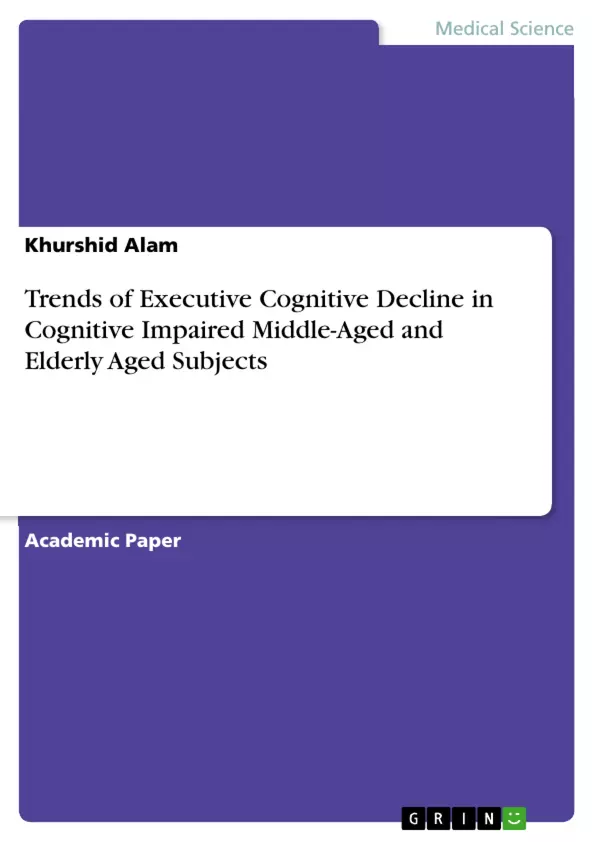This dissertation aims to understand and explore the impact of executive cognitive degradation, its association with the development of clinical complications among middle-aged subjects and elderly aged subjects. Furthermore, this research is based on the framework and theories of previous studies which are conducted regarding different key aspects of cognitive impairment that can introduce significant directions regarding the possible solutions of malfunctioning of the brain and associated outcomes.
In addition to this, the researcher collected data based on the inclusion criteria indicating the existence of the key phrases which indicates the research title in journal papers for gaining an in-depth knowledge of the subject area and obtaining the study's aim and objectives. Moreover, the researcher has used the Critical Appraisal Skills Programme to conduct this study as a tool that helps the researcher to identify the limitations and strengths of this study. However, the researcher has selected a longitudinal time horizon with a detailed database that presents the can time regarding cognitive impairment. Hence, this study has determined the impact of executive cognitive degradation and its association with the development of clinical complications.
Inhaltsverzeichnis (Table of Contents)
- ABSTRACT.
- INTRODUCTION
- BACKGROUND.
- Cognition
- Executive Cognitive Decline
- Cognitive decline in cognitive impaired elderly aged and middle-aged subjects--
- Contribution of MoCA.
- Problem statement-
- Rationale
- Aim
- Objective
- Research question--
- METHODOLOGY.
- Research Philosophy---
- Research Approach
- Research Strategy -
- Research Choice
- METHOD
- Data Collection Method---
- Ethics in research-
- Data Analysis Technique
- Search strategy
- Strategy of critical appraisal
- Mode of synthesis
- Time Horizon
- Results inclusive of critical appraisal-
- PRISMA FLOWCHART-
- Analysis
- Theme. 1: Identification of the trends of executive cognition in respect of the cognitively disabled middle-aged persons and elderly individuals
- Theme. 2: Impact of Cognitive impairment on the middle-aged individuals
- Theme. 3: The Impact of Age on Cognition in older ages---
- Theme. 4: Treatment of cognitive impairment and the challenges faced by the caretakers-
- Theme. 5: Long term consequences of cognitive impairment in the elderly aged person and middle-aged individuals---
- Theme. 6: An impact on the acceptance of Dementia screening ---
- Theme. 7:Impact of alcohol on Dementia and Cognitive Decline In The Elderly.
- Theme. 8: Impact of age-dependent relation of blood pressure on cognitive function and dementia
- Theme. 9: Impact of post-hospitalization on cognition decline.
- Discussion
- Identification of the trends of executive cognition
- Impact of Cognitive impairment on the middle-aged individuals-
- The Impact of Age on Cognition elderly people
- Treatment process of cognitive impairment--
- Long-term consequences of cognitive impairment -
- Acceptance impact of Dementia screening --
- Impact of alcohol on Dementia and Cognitive Decline In The Elderly-
- Impact of age-dependent relation of blood pressure on cognitive function and dementia
- impact of post-hospitalization on cognition decline--
- Conclusion-
- Conclusion -
- Limitations and Recommendations for Future Research-
Zielsetzung und Themenschwerpunkte (Objectives and Key Themes)
This dissertation explores the impact of executive cognitive degradation, its association with clinical complications among middle-aged and elderly individuals, and potential solutions for cognitive impairment.
- Trends of executive cognitive decline in middle-aged and elderly individuals
- Impact of cognitive impairment on middle-aged individuals
- The influence of age on cognitive function in older adults
- Treatment challenges and long-term consequences of cognitive impairment
- Impact of alcohol, blood pressure, and post-hospitalization on cognitive decline
Zusammenfassung der Kapitel (Chapter Summaries)
The dissertation begins with an introduction defining cognition and executive cognitive decline, outlining the problem statement and rationale for the research. It then details the methodology employed, including the research philosophy, approach, strategy, and choice. The method section describes the data collection method, ethical considerations, data analysis techniques, search strategy, critical appraisal strategy, mode of synthesis, and time horizon. Following this, the results are presented, inclusive of critical appraisal, along with a PRISMA flowchart. The analysis section explores various themes related to cognitive decline, including its identification, impact, and treatment. The discussion section provides a deeper analysis of these themes, exploring the impact of cognitive impairment on different age groups and individuals. Finally, the conclusion summarizes the findings and outlines limitations and recommendations for future research.
Schlüsselwörter (Keywords)
The main keywords and focus topics of this dissertation include executive cognitive decline, cognitive impairment, middle-aged individuals, elderly individuals, dementia, treatment, long-term consequences, alcohol, blood pressure, and post-hospitalization.
Frequently Asked Questions
What is executive cognitive decline?
It refers to the degradation of high-level cognitive processes such as planning, decision-making, and emotional regulation, often seen in aging subjects.
How does age impact cognitive function in older adults?
The study explores how cognitive impairment trends differ between middle-aged and elderly subjects, highlighting age-dependent clinical complications.
What role does alcohol play in cognitive decline?
The dissertation analyzes the impact of alcohol consumption on the development of dementia and cognitive decline in the elderly.
Are there medical factors linked to cognitive impairment?
Yes, the research examines factors like blood pressure relations and the impact of post-hospitalization on cognitive degradation.
What is the "Critical Appraisal Skills Programme" (CASP)?
CASP is a tool used by the researcher to identify the limitations and strengths of the journal papers analyzed in this longitudinal study.
- Citation du texte
- Khurshid Alam (Auteur), 2022, Trends of Executive Cognitive Decline in Cognitive Impaired Middle-Aged and Elderly Aged Subjects, Munich, GRIN Verlag, https://www.grin.com/document/1247061



